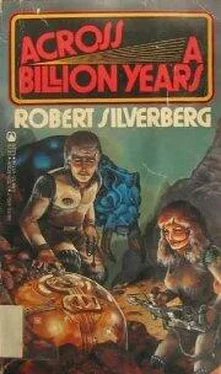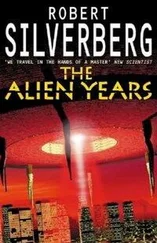It’s a complete planet-wide city of the High Ones. Not a crumpled ancient relic, but a clean, functioning, perfectly preserved living city. We can see vehicles moving, construction under way, lights going on and off.
What we can’t see are any High Ones. We’ve given the planet a thorough scanning in the hour since we got here, and Dihn Ruuu has had a look with its own scanning equipment, which is superior to ours. We and the robot conclude that McBurney IV is populated by plenty of robots. But if there are any Mirt Korp Ahm down there, they’re hidden from view.
Dihn Ruuu, faithful to the end, tells us stubbornly that we’re going to find High Ones here. For once we’re all in agreement that the robot’s wrong. It seems pretty clear to us that McBurney IV is another case of machines in perpetual motion: a planet inhabited by robots with an infinite life-span, waiting as Dihn Ruuu waited for the masters to come back. The masters, though, have been extinct for upward of half a billion years, but since the robots haven’t been programmed to consider such a possibility, they just go on and on and on about their chores, keeping the place in good trim, waiting, waiting, waiting some more.
We may be all wrong, naturally. What the zog: we may very well find the High Ones still in business on McBurney IV after all this time. This trip has produced so many surprises already that it isn’t safe to rule out any possibility. Nevertheless, I don’t really think the Mirt Korp Ahm have survived into our own era. And, as I said many months ago, I’m not sure I’d like to run into them if they did. I don’t know what I’d do if I ever found myself face to face with one of the superbeings who built this civilization. Fall flat on my snout and pay homage, I guess. It would be something like meeting a god. My company manners aren’t up to meeting gods.
We’ll know soon enough, because Dihn Ruuu is now trying to make radio contact with his fellow robots on the planet below, so that they don’t blast us out of the sky as we try to land. If all goes well we’ll be going into our entry orbit within the hour.
* * *
Dihn Ruuu has obtained landing permission for us. We’re on our way down.
March 10,
2376 McBurney IV
We didn’t make a powered landing; the robots wouldn’t let us. Communicating with Dihn Ruuu via the ship’s radio, they ordered us to cut our engines and submit to proxy control from below.
Mild crisis.
“Like zog I will,” Nick Ludwig shouted. “Turn my ship over to unknown alien forces? Risk everybody’s life? Either I land this on my own heat or I’m not landing!”
Dihn Ruuu said, “They refuse to permit anything else. You must realize that they have no knowledge of your competence as a pilot. All they see is a strange ship.”
Nick blustered some more. Dr. Schein mildly suggested that Nick had better give in. When Nick threatened to turn around and leave, Dr. Schein just as mildly began to talk about breach of contract. He brought up in an oblique way the question of the piece of the mercury mine that we had promised the spaceman, and other likesuch variosities. Nick yielded. He looked like he was ready to go nova, but he yielded.
Some five thousand meters from planetfall he cut the engines and we slipped back into a parking orbit. Then the robots grabbed us from below. As if yanking on us with a giant magnet, they pulled us out of orbit and guided us down. We were completely inertialess: just floating toward McBurney IV under no means of acceleration, but making a pretty good velocity. Nick Ludwig invited us up front to look at his instruments. I’ve never seen a man more perplexed. “What are they going to do?” he asked. “Catch us in a net? We’re building up speed at what looks like a one-g acceleration, but where’s the acceleration? Where are the laws of physics?”
Repealed, I guess. All the tonnage of our ship was nothing more than a straw on the wind, a sliver of iron in a magnetic field. We went down and down and down in a dreamy way and came to rest, gently, easily, in the precise center of a huge bullseye target where we were surrounded by gaunt, spidery rings of instruments, stretching away for hundreds of meters on every side. Golden loops and coils and towers and cross-hatched antennae hemmed us in: the equipment that had plucked us from the sky and set us down, no doubt. Nick Ludwig, pale and dazed, stared at all this in distress. It was an article of faith for poor Nick that planetary landings were to be made according to the principles of Newton, with thrust balancing pull, de-celeration canceling acceleration. But this landing was pure magic. Inertialess acceleration indeed!
The atmosphere of McBurney IV tested out as breathable, maybe, but risky on account of a heavy carbon dioxide concentration and some whiffs of something hexafluoride. So we went outside in breathing-suits, with Dihn Ruuu leading the way. The gravity was a bit more than Earthnorm; the weather was hot.
A dozen robots of Dihn Ruuu’s general shape greeted us. Clustered about us, like vast walking statues. Peered at us, sniffed us, touched us. Communicated with one another about us, via an audio channel we could not pick up.
“What are they saying?” I asked Dihn Ruuu. “Do the Mirt Korp Ahm still occupy this planet?”
“I have not yet been able to obtain information on that subject,” said the robot.
“Why are they so excited, then?”
“They have never seen protoplasmic life before,” Dihn Ruuu replied. “These are machines that were created by other machines. They are captured by you.”
“Captivated,” I corrected.
Dihn Ruuu didn’t acknowledge the correction. Our robot had hooked itself into the conversation and had ceased to take notice of us. For perhaps five minutes the delegation of metal beings conferred earnestly. Pilazinool seemed to be getting more than his share of attention; I realized finally that the High Ones robots thought that he was our robot, since so much of his body was nonorganic, and they were trying to draw him into the discussion. Dihn Ruuu explained, I think.
Vehicles appeared. Six long, slim aircars made of green plastic came whistling down, and from their bellies descended metal scoops, onto which we moved at the instructions of Dihn Ruuu. Up we went, into the aircars, and away, flying at a height of perhaps a hundred meters. To the city.
The city was everywhere. Once we were beyond the concentric rings of the spaceport and its intricate landing devices, we were in the city. It resembled in general look the High Ones cities we had seen on our globe, but in actual point of detail there were very few correspondences at all. The buildings did not dangle; each was firmly rooted, although there were so many levels that we had difficulty tracing any one row of buildings through the maze. The design of each building was different from those we had seen earlier; these were sleek pyramid-shaped structures, mostly, whose surfaces glowed with a soft inner light. I saw no windows.
We were taken to a particularly large pyramid and left by ourselves in a spherical room of colossal size. Little blobs of golden light drifted freely near the ceiling. Abstract decorative patterns, red streaks and purple dots and blue spirals, rotated dizzyingly in panels on the walls. There was nothing to sit on except the floor, which was carpeted in something soft and spongy and seemingly alive, for it wriggled and writhed whenever someone put his weight on it. All the robots left us. Including Dihn Ruuu, our one link to the real universe, our guide, our interpreter.
Two hours passed, and then two hours more.
We hardly spoke. We sat or stood or sprawled around the great room, puzzled, ill at ease, off guard, baffled into a state of total spinlessness. This episode had taken on all the qualities of a dream: our floating descent, the jostling and pinching given us by the towering robots, our inability to communicate with anyone, the eerie silence, the strangeness of the city, the unreality of this bare cavernous room in which we now found ourselves… prisoners.
Читать дальше












